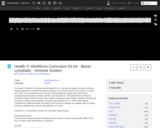
This unit describes the blood, lymphatic and immune systems.
- Subject:
- Health and Medical Science
- Material Type:
- Lecture
- Provider:
- Open Michigan
- Author:
- Oregon Health & Science University
- Date Added:
- 01/13/2021

This unit describes the blood, lymphatic and immune systems.
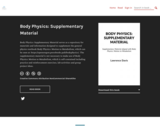
Body Physics: Supplementary Material serves as a repository for materials and information designed to supplement the general physics textbook Body Physics: Motion to Metabolism, which can be seen at: https://openoregon.pressbooks.pub/bodyphysics/. The supplementary material is not necessary to make use of Body Physics: Motion to Metabolism, which is self-contained including practice and reinforcement exercises, lab activities and group project ideas.
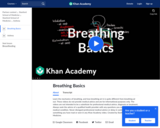
Learn the mechanics of breathing, and how breathing air in is quite different from breathing air out.
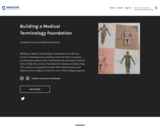
Building a Medical Terminology Foundation is an OER that focuses on breaking down medical terms into their word parts, pronouncing medical terms, and learning the meaning of medical terms within the context of introductory anatomy and physiology. This resource is targeted for health office administration and health services students in the first year of their college programs.
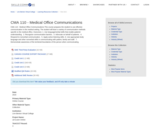
This Medical Office Communications course is designed to help prepare you to use effective communication in the medical setting. You will learn a variety of communication methods specific to the medical office. This course is designed to assist you in discovering applications of good communication skills, as well as provide elements of critical thinking. This course has 3 Credit Units that emphasize a variety of communication competencies.
NOTE: This is a Communication class which inherently requires meaningful interaction with other people. As a student in this class, you will be required to regularly have other individuals assist you with assignments. Use the Credit Unit Syllabi found below to help you plan ahead so that as you prepare to take this course you have a pool of individuals available who are willing to help you complete Module assessments.
Furthermore, although this is NOT a writing course, it is expected that you will write in a professional manner similar to the expectations when you are employed. This course requires APA style writing. For more information on this type of writing, the Purdue Online Writing Lab provides an excellent resource and can be found at the following link: OWL (Links to an external site.)Links to an external site. (Web page)
Write in complete sentences.
Do not use abbreviations. (Example: Do not instead of don't)
Use 12 point font - preferably New Times Roman or Arial
Use a program and check your spelling and grammar before submission EVERY time.
Course Outcomes:
1. Use language/verbal skills that enable patients' understanding.
2. Recognize communication barriers.
3. Advocate on behalf of patients.
4. Respond to nonverbal communication.
5. Apply active listening skills.
6. Use appropriate body language and other nonverbal skills in communicating with patient, family and staff.
7. Demonstrate awareness of the territorial boundaries of the person when communicating.
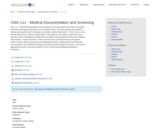
This course prepares the student to properly document and organize information for the medical record. This class prepares the student to initially screen patient calls for emergency and other medical intervention.
NOTE: This is a class that will require you to submit roleplay videos. Plan ahead as you prepare to take this course, and have a pool of individuals available who are willing to be videotaped for these short roleplay assessments.
Course Outcomes:
1. Create a list of current community resources for patient needs.
2. Perform patient screening using established protocols.
3. Organize technical information and summaries.
4. Use medical terminology correctly to document patient encounters.
5. Document in appropriate formats in Electronic Medical Record.
6. Demonstrate professional telephone techniques.
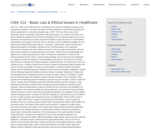
This course is designed to prepare you to comprehend, interpret, and respond to legal and ethical situations in the healthcare setting with diverse populations in a culturally competent way.
NOTE: This is an ethics class, which inherently requires meaningful conversations with other people. As a student in this class, you will be required to regularly meet with other individuals to discuss ethical questions that occur in healthcare. Be aware that you will be required to facilitate a group discussion for most Modules. Plan ahead as you prepare to take this course, and have a pool of individuals available who are willing to have ethical discussions with you.
Couse Outcomes
1. Demonstrate respect for diversity in approaching patients and families.
2. Identify the role of self-boundaries in the healthcare environment.
3. Recognize the role of patient advocacy in the your professional practice.
4. Discuss legal scope of practice for medical assistance and coders.
5. Explore issue of confidentiality as it applies to the medical assistant and to coders.
6. Describe the implications of HIPAA for the medical assistant and the coder in various medical settings.
7. Discuss licensure and certification as it applies to healthcare providers.
8. Describe liability, professional, personal injury, and third party insurance.
9. Compare and contrast physician, medical assistant, and coder roles in terms of standard of care.
10. Compare criminal and civil law as it applies to practicing medical assistant and coders.
11. Provide an example of tort law as it would apply to a medical assistant and coders.
12. Explain how the following impact the healthcare practice and give examples: Negligence.
13. Explain how the following impact the healthcare practice and give examples: Malpractice.
14. Explain how the following impact the healthcare practice and give examples: Statute of Limitations.
15. Explain how the following impact the healthcare practice and give examples: Good Samaritan Act(s).
16. Explain how the following impact the healthcare practice and give examples: Uniform Anatomical Gift Act.
17. Explain how the following impact the healthcare practice and give examples: Living Will/Advanced directives.
18. Explain how the following impact the healthcare practice and give examples: Medical durable power of attorney.
19. Identify how the Americans with Disabilities Act (ADA) applies to the medical assisting and coding profession.
20. List and discuss legal and illegal interview questions.
21. Discuss all levels of governmental legislation and regulation as they apply to medical assisting practice, including FDA and DEA regulations.
22. Describe the process to follow if an error is made in patient care Respond to issues of confidentiality.
23. Perform within scope of practice. Apply HIPAA rules in regard to privacy/release of information.
24. Practice within the standard of care for a medical assistant and/or coder.
25. Incorporate the Patient's Bill of Right's into personal practice. and medical office policies and procedures.
26. Complete an incident report.
27. Document accurately in the patient record.
28. Apply local, state and federal healthcare legislation appropriate to the medical assisting and coding practice setting.
29. Demonstrate sensitivity to patient rights.
30. Demonstrate awareness of the consequences of not working within the legal scope of practice.
31. Recognize the importance of local, state and federal legislation and regulations in the practice setting.
32. Differentiate between legal, ethical, and moral issues affecting healthcare.
33. Compare personal, professional and organizational ethics.
34. Discuss the role of cultural, social and ethnic diversity in ethical performance in the healthcare practice.
35. Identify where to report illegal and/or unsafe activities and behaviors that affect health, safety and welfare of others.
36. Identify the effect personal ethics may have on professional performance.
37. Report illegal and/or unsafe activities and behaviors that affect health, safety and welfare of others to proper authorities.
38. Develop a plan for separation of personal and professional ethics.
39. Apply ethical behaviors, including honesty, integrity in the performance of medical assisting and coding practice.
40. Examine the impact personal ethics and morals may have on the individual's practice.
41. Demonstrate awareness of diversity in providing patient care.
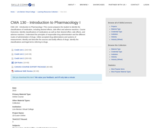
This course is designed to prepare you to comprehend, interpret, and respond to legal and ethical situations in the healthcare setting with diverse populations in a culturally competent way.
NOTE: This is an ethics class, which inherently requires meaningful conversations with other people. As a student in this class, you will be required to regularly meet with other individuals to discuss ethical questions that occur in healthcare. Be aware that you will be required to facilitate a group discussion for most Modules. Plan ahead as you prepare to take this course, and have a pool of individuals available who are willing to have ethical discussions with you.
Class Outcomes:
1. Demonstrate respect for diversity in approaching patients and families.
2. Identify the role of self-boundaries in the healthcare environment.
3. Recognize the role of patient advocacy in the your professional practice.
4. Discuss legal scope of practice for medical assistance and coders.
5. Explore issue of confidentiality as it applies to the medical assistant and to coders.
6. Describe the implications of HIPAA for the medical assistant and the coder in various medical settings.
7. Discuss licensure and certification as it applies to healthcare providers.
8. Describe liability, professional, personal injury, and third party insurance.
9. Compare and contrast physician, medical assistant, and coder roles in terms of standard of care.
10. Compare criminal and civil law as it applies to practicing medical assistant and coders.
11. Provide an example of tort law as it would apply to a medical assistant and coders.
12 Explain how the following impact the healthcare practice and give examples: Negligence.
13. Explain how the following impact the healthcare practice and give examples: Malpractice.
14. Explain how the following impact the healthcare practice and give examples: Statute of Limitations.
15. Explain how the following impact the healthcare practice and give examples: Good Samaritan Act(s).
16. Explain how the following impact the healthcare practice and give examples: Uniform Anatomical Gift Act.
17. Explain how the following impact the healthcare practice and give examples: Living Will/Advanced directives.
18. Explain how the following impact the healthcare practice and give examples: Medical durable power of attorney.
19. Identify how the Americans with Disabilities Act (ADA) applies to the medical assisting and coding profession.
20. List and discuss legal and illegal interview questions.
21. Discuss all levels of governmental legislation and regulation as they apply to medical assisting practice, including FDA and DEA regulations.
22. Describe the process to follow if an error is made in patient care Respond to issues of confidentiality.
23. Perform within scope of practice. Apply HIPAA rules in regard to privacy/release of information.
24. Practice within the standard of care for a medical assistant and/or coder.
25. Incorporate the Patient's Bill of Right's into personal practice. and medical office policies and procedures.
26. Complete an incident report.
27. Document accurately in the patient record.
28. Apply local, state and federal healthcare legislation appropriate to the medical assisting and coding practice setting.
29. Demonstrate sensitivity to patient rights.
30. Demonstrate awareness of the consequences of not working within the legal scope of practice.
31. Recognize the importance of local, state and federal legislation and regulations in the practice setting.
32. Differentiate between legal, ethical, and moral issues affecting healthcare.
33. Compare personal, professional and organizational ethics.
34. Discuss the role of cultural, social and ethnic diversity in ethical performance in the healthcare practice.
35. Identify where to report illegal and/or unsafe activities and behaviors that affect health, safety and welfare of others.
36. Identify the effect personal ethics may have on professional performance.
37. Report illegal and/or unsafe activities and behaviors that affect health, safety and welfare of others to proper authorities.
38. Develop a plan for separation of personal and professional ethics.
39. Apply ethical behaviors, including honesty, integrity in the performance of medical assisting and coding practice.
40. Examine the impact personal ethics and morals may have on the individual's practice.
41. Demonstrate awareness of diversity in providing patient care.
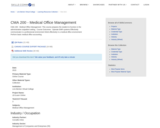
This course prepares the student to function in the administrative outpatient setting.
Course Outcomes:
1. Operate EMR systems
2. Effectively communicate in a professional environment
3. Work effectively in a medical office environment
4. Perform basic medical office accounting.
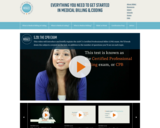
This video will introduce and briefly explain the AAPC's Certified Professional Biller (CPB) exam. We'll break down the subjects covered on the test, in addition to the number of questions you'll see on each topic.
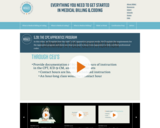
In this video, we'll explain how the AAPC's CPC Apprentice program works. We'll explain the requirements for the Apprentice program and show you what you need to move from Apprentice to fully certified professional coder.
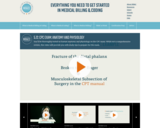
You'll be thoroughly tested on human anatomy and physiology on the CPC exam. While not a comprehensive review, this video will provide you with study tips to prepare for the exam.
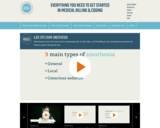
Reviewing for the CPC exam can be a daunting task. In this video, we'll briefly go over Anesthesia and show you what to expect during the test.
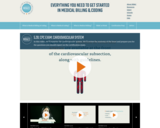
In this video, we'll examine the cardiovascular system. We'll review the anatomy of the heart and prepare you for the questions you should expect on the certification exam.
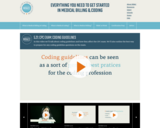
In this video we'll talk about coding guidelines and how they affect the CPC exam. We'll also outline the best way to prepare for any coding guideline questions on the exam.
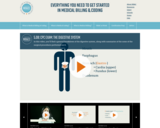
In this video, you'll find a general breakdown of the digestive system, along with summaries of the some of the surgical procedures performed on it.
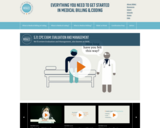
We'll review Evaluation and Management, also known as E&M.
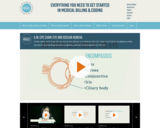
In this video, we'll cover the eye and ocular adnexa as it relates to the CPC exam. You'll find a breakdown of the eye and its surrounding muscles and glands, and tips for preparation for the test.
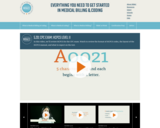
In this video, we'll review HCPCS for the CPC exam. Watch to review the format of HCPCS codes, the layout of the HCPCS manual, and what to expect on the test.
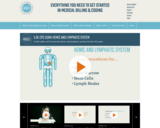
In this video, we'll review the hemic and lymphatic systems for the CPC exam.